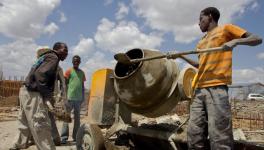Who Funds the World's Dirtiest Energy Projects?
Transcript
DIMITRI LASCARIS: This is Dimitri Lascaris for The Real News. In a 2012 New York Times op-ed, scientist and then-director of the NASA Goddard Institute for Space Studies, James Hansen wrote that if Canada's tar sands were fully exploited and we continue to burn the conventional fossil fuel of gas, oil and coal, then, "Concentrations of carbon dioxide in the atmosphere eventually would reach levels higher than in the Pliocene era, more than 2.5 million years ago when sea level was at least 50 feet higher than it is now.
"Further," Dr. Hanson wrote, "the deposits of sand saturated with bitumen contain twice the amount of carbon dioxide emitted by oil use in our entire history," and that 20-50% of the planet's species would be driven to extinction. It would most likely be, as Dr. Hanson put it, "Game over for human civilization."
Yet, over seven years later, major financial institutions continue to finance Alberta's tar sands. In response, environmental organizations, including Rainforest Action Network, have now released a new report, titled "Funding Tar Sands: Private Banks vs. the Paris Agreement." With us to discuss the report is an author of the report, Alison Kirsch. Alison is the Climate and Energy Program research coordinator at Rainforest Action Network. One of the publishers of the report, she's joining us from San Francisco. Welcome to The Real News Network, Alison.
ALISON KIRSCH: Thanks very much. Thanks for having me.
DIMITRI LASCARIS: So, according to your new report commercial banks continue to finance the tar sand sector at levels that do not align with the Paris Agreement target of keeping the global temperature increase to less than 1.5 degrees celsius, or at most 2 degrees celsius for low preindustrial levels. And in fact, finance levels are surging in 2017, according to the report, to levels 50% greater than all of the financing committed in 2016.
I'd like to start by breaking down, who are the major culprits here, in terms of financing the tar sands projects?
ALISON KIRSCH: Yeah, sure. I mean, the first thing to say, and you spelled this out soberly in the introduction, is that tar sands really do spell disaster for local environments and the climate, but also indigenous rights, and that is why we've focused on this report, to really call out bank financing of tar sands that is enabling that climate destruction, environmental destruction, and human rights abuse.
As you mentioned, we're very alarmed that tar sands' financing has gone up in the last year, when really this is a sector that is flatly incompatible with the Paris Climate Agreement, an expansion of it, in particular. As far as who the culprits are, the Canadian banks absolutely top the list. The tar sands, as you mentioned, are almost all located in Alberta in Canada, and the Canadian banks have very deep pockets for the tar sands.
That said, a huge culprit that we're focused on is JPMorgan Chase, which has been found to be the number one U.S. funder of tar sands in this report and in every year looked at in this report. So, that is absolutely alarming and unacceptable.
You've also got European banks and Japanese banks whose funding to tar sands has increased in the last year.
DIMITRI LASCARIS: So, just, I want to go back to Canada. Their private sector is a major player... Bank of Nova Scotia. TD Canada Trust. Toronto Dominion Bank, I should say. Bank of Montreal. The Canadian Imperial Bank of Commerce. National Bank. I think I may have omitted one. Do one or two of those financial institutions stand out as having a major commitment to financing tar sands projects, or are they all pretty much equally culpable?
ALISON KIRSCH: As far as commitments go, these banks sort of act as a pack in that they support the tar sands sector as key pillar of the Canadian economy, which is something that we challenge. That doesn't need to be a given fact. As far as financing goes, TD, Toronto Dominion, and RBC, the Royal Bank of Canada, are absolutely at the top of the list, as far as dollars financed to tar sands. Pipelines, companies, and mines.
DIMITRI LASCARIS: And you mentioned specifically the case of JPMorgan. I understand that there's a quite remarkable discrepancy between the statements of the JPMorgan CEO, Jamie Dimon, about climate change and the enormous financing for tar sands projects that JPMorgan has created. What is the nature of that discrepancy?
ALISON KIRSCH: When President Trump announced that he would be pulling the U.S. out of the Paris Climate Agreement, Jamie Dimon, CEO of JPMorgan Chase, who was at the time on Trump's business council, stood up and used his platform to say that he "Absolutely disagrees with the administration on this issue." At the same time that he was saying those words, though, this report shows that his bank was not acting on them, because as I mentioned, financing tar sands just does not compute with the Paris Climate Agreement's goals of limiting destructive climate change. So, that's where we're really seeing the hypocrisy in private bank financing, and why we really frame this report as private banks vs. the Paris Climate Agreement.
The way I like to think of it is, when Trump announced he would be pulling the U.S. out of Paris, he drew a line, and he put the Paris Agreement and the international community's' commitment to limit climate change on one side, and he put his administration's pro-fossil fuels policies on the other side, and bank policies on tar sands determine which side of the line they fall on. What we're seeing here is that JPMorgan Chase, the Canadian banks, very, very many of the banks looked at in this report fall on the Trump pro-fossil fuel side of the line, and that is really dangerous.
DIMITRI LASCARIS: You mentioned earlier, talked about some Asian banks, particularly Japanese banks. Historically, the Chinese petroleum sector has invested significantly into tar sands. Are there any Chinese banks that are leading the way in terms of financing tar sands projects today, or have they retreated or refrained from getting into the financing of that sector in a serious way?
ALISON KIRSCH: So, in this report, we actually didn't analyze the Chinese banks, and we focused on the Japanese banks because of the role that they are playing in U.S. companies, US projects, Canadian companies, and Canadian projects, and also because of the increased civil society calls in Japan for banks to take into account environmental and social risks in a way that Japanese banks do not at this point.
So, you will see Bank of Tokyo, Mitsubishi UFJ, Mizuho and Sumitomo Mitsui highlighted in this report for their financing. Bank of Tokyo, Mitsubishi UFJ, and Mitsubishi UFJ Financial group is at the leader of the pack as far as Japanese banks go, and we do see it as a banker of many of the companies behind some of these controversial tar sands pipelines that are on the table, which is sort of an interesting picture, when you have all of this foreign finance flowing into projects that have real, on-the-ground impacts in North America.
DIMITRI LASCARIS: Now, France's largest bank, BNP Paribas, recently made an important announcement, as the eighth-largest bank in the world about financing the tar sands projects. What did it announce, and do you think that this might be a game changer?
ALISON KIRSCH: Absolutely. So, last month, BNP Paribas announced that it would severely restrict its financing to the tar sands buy, both excluding project finance for tar sands pipelines and mines and any other projects, and also by excluding financing for companies where 30% or more of their business is in tar sands. And there are a few other caveats in there, but essentially what that means is that the bank isn't going to finance any of the tar sand pipelines on the table, and it is actually going to wind down its relationships with pure play tar sands companies, and that is huge, and it was a game changer.
You see in this report, BNP Paribas has the highest grade of any global bank by a bit, so we in civil society will absolutely be acting as watchdogs to make sure that policy is implemented and strengthened if it can be, but at the same time, we are calling on its peers in Europe and around the world, including JPMorgan Chase, to meet or beat that commitment, and also to announce their exit from the tar sand sector and their intent to strengthen policies on indigenous rights.
DIMITRI LASCARIS: And lastly, and perhaps most importantly, in the view of the Rainforest Action Network, what can the public do to pressure these financial institutions to finally assume responsibility and stop financing the wrecking of the planet by the tar sands industry?
ALISON KIRSCH: That's a great question, because that's the fun part. As I mentioned, at RAN we have a full-fledged campaign going against JPMorgan Chase as the number one U.S. Funder of tar sands and we are pressuring them to meet or beat BNP Paribas' commitment to get out of the sector entirely. You can learn more about that and join us at RAN.org/Chase. That's R-A-N.O-R-G/C-H-A-S-E.
We're doing all sorts of pressure tactics, everything from publishing reports such as this, to actually showing up at the bank's doorstep to highlight their financing of this destructive sector and make it absolutely unacceptable to do so by increasing the risk that they hold every time that they finance one of these companies or projects.
DIMITRI LASCARIS This has been Dimitri Lascaris speaking to Alison Kirsch of the Rainforest Action Network about a new report showing, remarkably, that the financing of dirty oil tar sands projects is on the rise. Thank you very much for joining us today, Alison.
ALISON KIRSCH: Thanks for having me. Great to talk to you.
Disclaimer: The views expressed here are the author's personal views, and do not necessarily represent the views of Newsclick.
Get the latest reports & analysis with people's perspective on Protests, movements & deep analytical videos, discussions of the current affairs in your Telegram app. Subscribe to NewsClick's Telegram channel & get Real-Time updates on stories, as they get published on our website.
























